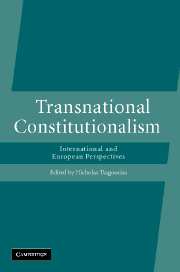Book contents
- Frontmatter
- Contents
- List of contributors
- Foreword by Malcolm D. Evans
- List of abbreviations
- Introduction – Constitutionalism: a theoretical roadmap
- Part I States, courts and constitutional principles
- Part II Transnational constitutional interface
- 5 Hierarchy in organisations: regional bodies and the united nations
- 6 The multilevel constitution of European foreign relations
- 7 Self-determination of peoples and transnational regimes: a foundational principle of global governance
- 8 Challenges to international and European corporatism presented by deliberative trends in governance
- Part III Visions of international constitutionalism
- Index
8 - Challenges to international and European corporatism presented by deliberative trends in governance
Published online by Cambridge University Press: 01 July 2009
- Frontmatter
- Contents
- List of contributors
- Foreword by Malcolm D. Evans
- List of abbreviations
- Introduction – Constitutionalism: a theoretical roadmap
- Part I States, courts and constitutional principles
- Part II Transnational constitutional interface
- 5 Hierarchy in organisations: regional bodies and the united nations
- 6 The multilevel constitution of European foreign relations
- 7 Self-determination of peoples and transnational regimes: a foundational principle of global governance
- 8 Challenges to international and European corporatism presented by deliberative trends in governance
- Part III Visions of international constitutionalism
- Index
Summary
Introduction
Debates over constitutionalism have led increasingly to close analysis of forms of governance, the aim being to design a constitutional framework that will enhance the legitimacy of international and European legal orders. In this respect, there have been attempts to transpose theoretical constructs utilised at the national level to the transnational level. This chapter examines two such constructs. One is the notion of ‘corporatism’, namely the priority given to functional participation of management and labour in norm-setting, so as to ensure that their interests are adequately reflected in social policy (in general) and labour standards (in particular). This form of governance can be understood as being concerned with ‘output’ legitimacy, since legal norms formulated through this process are likely to be workable in practice. A second construct is that of ‘deliberative democracy’, which is more concerned with ‘input’ legitimacy, that is, the discursive process by which a rational decision is taken that transcends the interests of particular parties. This chapter considers whether these two forms of constitutional legitimacy are reconcilable, and how such reconciliation might be achieved within international and European institutions.
Two examples of transnational corporatism are considered. The first is the ‘tripartite’ constitutional foundation of the International Labour Organization (ILO), established in 1919, which ensures that employer and worker representatives share in decision-making alongside government representatives. The second is the predominantly ‘bipartite’ process of social dialogue between management and labour which emerged within the European Union.
- Type
- Chapter
- Information
- Transnational ConstitutionalismInternational and European Perspectives, pp. 269 - 304Publisher: Cambridge University PressPrint publication year: 2007
- 1
- Cited by

